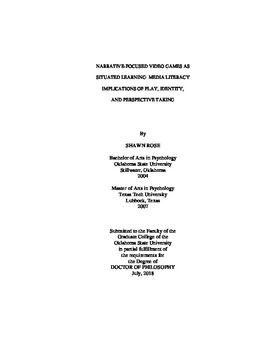| dc.contributor.advisor | Brown, Pamela | |
| dc.contributor.author | Rose, Shawn | |
| dc.date.accessioned | 2019-03-22T18:57:13Z | |
| dc.date.available | 2019-03-22T18:57:13Z | |
| dc.date.issued | 2018-07 | |
| dc.identifier.uri | https://hdl.handle.net/11244/317668 | |
| dc.description.abstract | With the emergence of more narrative-focused video games, this study attempted to better understand how college students construct meaning through these interactive experiences as a means of understanding social and cultural differences and perspectives. This study explored how playing narrative-focused video games may interconnect with college students' lived experiences, their understanding of others through perspective taking, and their sense of identity in reality and in-game through the lens of media literacy. The theoretical framework utilized in this study drew from situated learning theory and Gee's theory of identity and identity stories. Data collection for this study used multiple data sources including college student focus groups, gameplay observations of students playing Gone Home, and individual participant interviews. Qualitative, narrative analysis was utilized to explore the identity stories shared by five college student participants as well as the themes that emerged across the various data sources. The results of this study found that participants situated video game narratives within their lived experiences, assimilating the experiences within the game with their own stories and reflections. Preliminary evidence emerged that participants engaged in perspective taking tendencies while playing narrative-focused games; however, this finding appears to be connected with the participant's level of awareness and attention to detail while playing the game. This study also explored concepts of the real, virtual, and projective identities (Gee, 2007). Results found that participants utilized video games that tell stories as a vehicle for exploring their own identity as they project themselves into the characters they embody within the game. While participants primarily described their real identity in regard to discursively established identity traits, video games allowed them to explore alternative points of view. Through gameplay observations and the stories participants shared, evidence in support for the media literacy concepts of play and performance emerged, while the media literacies of simulation and negotiation were less prominently featured. Implications for education and future research are also discussed. | |
| dc.format | application/pdf | |
| dc.language | en_US | |
| dc.rights | Copyright is held by the author who has granted the Oklahoma State University Library the non-exclusive right to share this material in its institutional repository. Contact Digital Library Services at lib-dls@okstate.edu or 405-744-9161 for the permission policy on the use, reproduction or distribution of this material. | |
| dc.title | Narrative-focused video games as situated learning: Media literacy implications of play, identity, and perspective taking | |
| dc.contributor.committeeMember | Wang, Hongyu | |
| dc.contributor.committeeMember | Nowell, Shanedra | |
| dc.contributor.committeeMember | Lewis, Bobbi Kay | |
| osu.filename | Rose_okstate_0664D_15879.pdf | |
| osu.accesstype | Open Access | |
| dc.type.genre | Dissertation | |
| dc.type.material | Text | |
| thesis.degree.discipline | Education | |
| thesis.degree.grantor | Oklahoma State University | |
